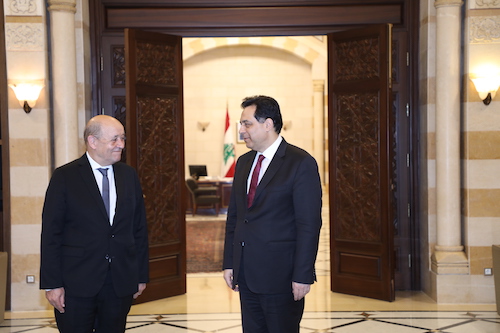Your Excellency, I would like to welcome you on your first official visit as French Minister of Foreign Affairs. You know Lebanon well; Lebanon considers you a historical friend of Lebanon, and France has stood by Lebanon in difficult times and I am sure that it will not abandon it today.
I thank France for its assistance in the Cedre Conference and in the previous Paris conferences, for permanently standing beside Lebanon, and for the role it play in the International Support Group for Lebanon, in which France constitutes the driving force.
I also thank France for its active contribution to the UNIFIL peacekeepers in Southern Lebanon, as well as its supportive role for Lebanon in the United Nations Security Council.
I thank France for the assistance it provides to the Lebanese army and other Lebanese security forces, in addition to its assistance in fighting the coronavirus pandemic.
Challenges faced by the government
The government has gained the confidence vote on February 11th; shortly after, it faced the problem of public debt securities then the coronavirus pandemic.
We actually started working as of May 1st; thus, we embarked on reforms 3 months ago.
We have accomplished many reforms and have faced several obstacles; we have also set a timeline for the remaining reforms.
Also, with regard to Cedre-related reforms, we have established a ministerial committee to follow up on the reforms.
With reference to the electricity plan, the electricity file has been linked to the IMF negotiations, which disrupts the electricity file.
We have adopted the previous government's plan regarding the electricity file, provided that we start with Al-Zahrani and we remain committed to this rule.
A new board of directors has been appointed, and we are currently preparing for the appointment of the Electricity Regulatory Authority.
We are seeking France’s support in the electricity file and with the IMF; we also hope that the French GE company will participate in building power plants.
We are moving forward with reforms in full transparency.
This is a government of specialists.
The constitutional powers granted to the Cabinet do not allow us to move beyond constitutional institutions; therefore, reforms must pass through existing institutions, and the government cannot undertake reforms alone.
Forensic audit
The Council of Ministers has approved the forensic auditing of the Central Bank of Lebanon to uncover the financial gap, its causes and background, for we are keen on transparency.
The important thing is that the BDL’s forensic audit opens doors towards other institutions in terms of forensic audit, because all monetary and financial transactions go through the BDL. Consequently, this audit will lead to auditing in other public facilities such as EDL and the port, as well as of all cash operations of the State.
Besides, two days ago, we have approved the adoption of scanners at borders, ports and the airport, so as to control goods at customs and generate large previously wasted incomes to the State.
Crossings
Also, we have closed smuggling crossings at borders, and we continue to strictly monitor land borders and control illegal crossings.
Negotiations with the IMF
We have launched negotiations with the International Monetary Fund. Political disagreements have delayed the negotiations. These disagreements are related to the previously prevailing approach in dealing with the financial file and the approach followed by the current government, which embraces openness, transparency and realism in dealing with the financial crisis.
Today, after a two months delay, we have reached the second square, that is, how to allocate losses among the Lebanese State, the Central Bank of Lebanon and the banking sector. We are determined to moving forward with the negotiation process with the IMF, and we are seeking your assistance in speeding up the process, for Lebanon’s financial situation cannot tolerate further delay, especially in light of the social and living pressure on the Lebanese, as well as on the displaced Syrians. This could lead to a large Lebanese migration wave, in addition to a Syrian displacement of IDPs from Lebanon in various directions.
We are facing a peril in this matter.
Repercussions of increasing poverty rates
The increasing poverty rates in Lebanon to frightening levels causes sensitivities with the displaced Syrians who receive international aid, while the Lebanese feel that the international community has abandoned them or is punishing them with an economic and financial blockade despite the sacrifices Lebanon made to accommodate the displaced Syrians. Concerns began to raise among host communities regarding the presence of the displaced who, in turn, are starting to feel uncomfortable, which is dangerous.
UNIFIL
We hear about a possible American reduction in UNIFIL funding in addition to either a change of mandate or a reduction of the number of UNIFIL peacekeepers in Southern Lebanon.
Lebanon cannot accept the amendment of the UNIFIL’s mandate; coordination with the Lebanese army will ensure that UNIFIL's missions are fully executed in a way that observes Lebanese laws, especially the Lebanese Constitution.
We are seeking France’s understanding and support for Lebanon to renew UNIFIL's mandate without amendments and without a troop‑level reduction in order to preserve international peace and security and enable international peacekeeping forces to implement resolution 1701 to which Lebanon is bound.
We fear that any UNIFIL troop‑level reduction will lead to a vacuum that the Lebanese army cannot fill because of the multitude of missions it undertakes throughout Lebanese territory.
Support for schools
The government has decided to disburse 500 billion pounds to support public and private schools in Lebanon, including about 1500 private schools and 200 free private schools; we expect about 100,000 students from private schools to move to public schools this year due to the social and living crisis Lebanon is going through. We thank France for planning to support some schools, and we hope that this French support will expand to include Lebanese public schools.






